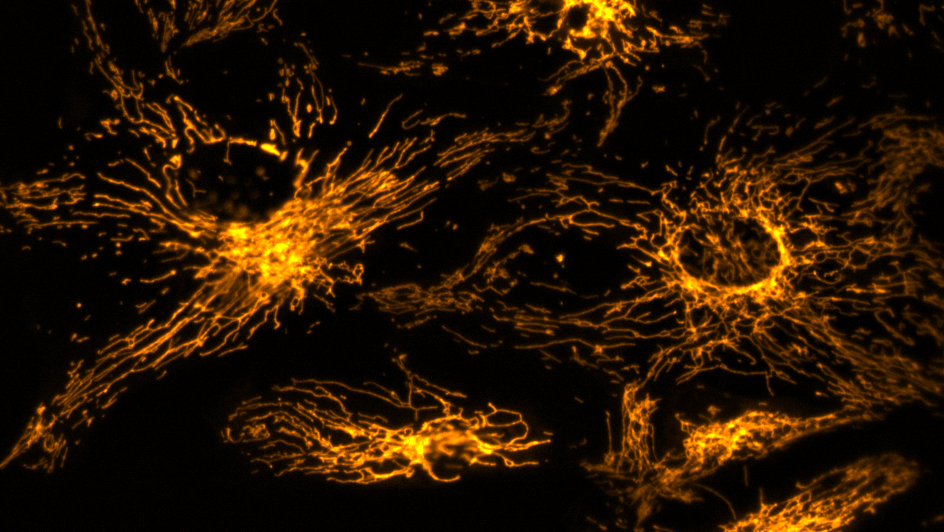
Image: Staining for reactive oxygen species in retina pigment epithelial cells. Credit: Dr Jörg Mansfeld
Scientists have discovered how naturally occurring but unstable molecules, known as free radicals, can control the fundamental process of cell division, which, when it goes wrong, can lead to uncontrolled cell growth and cancer.
In the new study, the researchers show that hydrogen peroxide, a reactive oxygen molecule derived from free radicals containing oxygen, activates a key protein – cyclin-dependent kinase 2 or CDK2 – that promotes cell division via a previously unreported mechanism.
These findings establish an important role for free radicals and hydrogen peroxide during cell division and open up a potential new way to target numerous cancers linked to defective CDK2 activity.
An important signalling molecule
Reactive oxygen species are highly unstable, oxygen-containing molecules that can easily react with other molecules in the cell. They are produced by the mitochondria – the powerhouses of the cell –during respiration when they break down nutrients to create energy for the cell.
Free radicals, such as reactive oxygen species, were initially recognised as harmful agents that damage proteins and DNA through oxidation. In recent years, however, they have been identified as an important signalling molecule that can stimulate cell division in the right concentrations.
Scientists at The Institute of Cancer Research, London, and Technische Universität Dresden, Germany, used cutting-edge genetic and metabolic tools in human retinal pigment epithelial cells to study precisely where and when free radicals are produced during cell division.
Cancer cells require free radicals to promote aspects of tumour development and progression, therefore understanding its role in cell division is of significant medical relevance.
Driving cell division
The researchers found that levels of free radical production correlated with mitochondrial activity and increased during different stages of cell division. The team showed that removing free radicals from the cell using antioxidant and metabolic treatments disrupted normal cell division, leading to an accumulation of cells that were stalled at the point of DNA replication.
Notably, they observed that the levels of free radicals mirrored the activity of the key CDK2 protein, which is required for DNA replication during cell division, leading them to investigate further the relationship between free radicals and CDK2.
The research, published in Developmental Cell and recently selected as a research highlight by Nature Reviews Molecular Cell Biology, was largely funded by the European Research Council, with additional funding from the ICR, which is both a research institute and a charity, and Cancer Research UK’s radiation research network (RadNet).
Free radicals are also produced during radiotherapy treatment and, at high enough concentration, can be harmful to the cancer. Many cancer cells display elevated levels of free radicals and ensure survival by producing their own antioxidants to limit the levels of potentially harmful molecules in the cell. Radiotherapy is an effective way to increase oxidative stress in cancer cells and tip the balance in favour of cell death.
A novel way of targeting CDK2
Due to its critical role in cell division, CDK2 has been a longstanding target for cancer therapy and many attempts have been made in the lab to develop an inhibitor that blocks its function in cancer cells. In mammals, CDK2 is notoriously difficult to inhibit, often leading to off-target effects because of the protein’s similarity to other CDK proteins.
Using various genetic tools and techniques, the team discovered that hydrogen peroxide was required to oxidise CDK2 at a specific site to maintain its activity and function while cells replicate their DNA. Crucially, this newly uncovered site was unique to CDK2 protein.
The findings from this study uncover a possible new therapeutic target for discovering drugs against CDK2, opening up new research opportunities to explore ways to treat certain cancers more effectively.
A simple and elegant mechanism
Study leader Dr Jörg Mansfeld, Leader of the Post-translational Modifications and Cell Proliferation Team at the ICR, who previously led this research at the Biotechnology Center (BIOTEC) of the Technische Universität Dresden, Germany, said:
“Our study identifies a simple and elegant mechanism that links cell division with the process of generating energy in the cell. Previous research in the field had shown that reactive oxygen species could promote cell division but, until now, it was unclear how this occurred.
“Our findings show for the first time that a key protein for cell division, CDK2, can be directly regulated by free radicals produced by the mitochondria during the energy generation process in the cell. We studied this process in different types of cells, including breast cancer cells, and found that CDK2 can be oxidised in all these settings, indicating its importance.
“We reveal a new CDK2 oxidation site, which could be a novel way of targeting the protein. CDK2 oxidation could be exploited to develop a new class of CDK2-specific inhibitors that do not target closely related kinases. There is emerging evidence that inhibiting CDK2 in certain cancers such as ovarian cancer, MYCN-amplified neuroblastoma and KRAS mutant lung cancers could potentially be very effective.
“We are also now investigating if the free radicals produced during radiotherapy can also oxidise CDK2 or other key proteins required for cell division, and whether this determines which cells are sensitive or resistant to the treatment.”